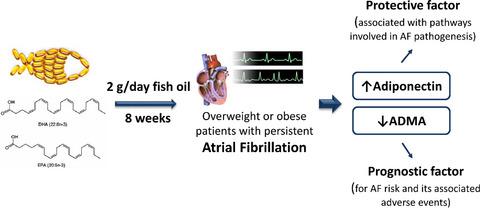当前位置:
X-MOL 学术
›
Food Sci. Nutr.
›
论文详情
Our official English website, www.x-mol.net, welcomes your
feedback! (Note: you will need to create a separate account there.)
Effect of fish oil on circulating asymmetric dimethylarginine and adiponectin in overweight or obese patients with atrial fibrillation.
Food Science & Nutrition ( IF 3.5 ) Pub Date : 2020-03-11 , DOI: 10.1002/fsn3.1518 Elnaz Khorrami 1 , Mohammad Javad Hosseinzadeh-Attar 1, 2, 3 , Ahmad Esmaillzadeh 4 , Elham Alipoor 5 , Mostafa Hosseini 6 , Zahra Emkanjou 7 , Roya Kolahdouz Mohammadi 5 , Sina Moradmand 8
Food Science & Nutrition ( IF 3.5 ) Pub Date : 2020-03-11 , DOI: 10.1002/fsn3.1518 Elnaz Khorrami 1 , Mohammad Javad Hosseinzadeh-Attar 1, 2, 3 , Ahmad Esmaillzadeh 4 , Elham Alipoor 5 , Mostafa Hosseini 6 , Zahra Emkanjou 7 , Roya Kolahdouz Mohammadi 5 , Sina Moradmand 8
Affiliation

|
Obesity and adipose‐derived peptides might be involved in the pathogenesis of atrial fibrillation (AF). Adiponectin plays a major role in the modulation of several metabolic pathways, and asymmetric dimethylarginine (ADMA) has been suggested to be predictive of AF and associated adverse events. The aim of this study was to investigate the effect of fish oil supplementation on circulating adiponectin and ADMA in overweight or obese patients with persistent AF. In this randomized, double‐blind, placebo‐controlled trial, 80 overweight or obese (body mass index (BMI) ≥ 25 kg/m2) patients with persistent AF were randomly assigned to two groups to receive either 2 g/day fish oil or placebo, for 8 weeks. Serum levels of adiponectin and ADMA, and anthropometric indexes were measured. This study showed that serum adiponectin concentrations increased significantly following fish oil supplementation compared with the placebo group (13.15 ± 7.33 vs. 11.88 ± 6.94 µg/ml; p = .026). A significant reduction was also observed in serum ADMA levels in the fish oil compared with the placebo group following the intervention (0.6 ± 0.13 vs. 0.72 ± 0.15 µmol/L; p = .001). The changes in serum adiponectin and ADMA concentrations remained significant after adjustments for baseline values, age, sex, and changes of BMI and waist circumference (p = .011 and p = .001, respectively). In conclusion, 8 weeks supplementation with fish oil increased serum adiponectin and decreased ADMA concentrations in overweight or obese patients with persistent AF. As adiponectin and ADMA are suggested to be involved in many pathways associated with AF, the current findings might be promising in the clinical management of this disease, an issue that needs further investigations.
中文翻译:

鱼油对超重或肥胖房颤患者循环不对称二甲基精氨酸和脂联素的影响。
肥胖和脂肪源性肽可能参与心房颤动(AF)的发病机制。脂联素在多种代谢途径的调节中发挥着重要作用,不对称二甲基精氨酸 (ADMA) 被认为可以预测 AF 和相关不良事件。本研究的目的是探讨补充鱼油对超重或肥胖持续性房颤患者循环脂联素和 ADMA 的影响。在这项随机、双盲、安慰剂对照试验中,80 名超重或肥胖(体重指数 (BMI) ≥ 25 kg/m 2 )持续性 AF 患者被随机分配到两组,接受 2 g/天的鱼油治疗或安慰剂,持续 8 周。测量脂联素和 ADMA 的血清水平以及人体测量指数。这项研究表明,与安慰剂组相比,补充鱼油后血清脂联素浓度显着增加(13.15 ± 7.33 vs. 11.88 ± 6.94 µg/ml; p = .026)。与安慰剂组相比,干预后鱼油中的血清 ADMA 水平也显着降低(0.6 ± 0.13 vs. 0.72 ± 0.15 µmol/L; p = .001)。在调整基线值、年龄、性别以及 BMI 和腰围变化后,血清脂联素和 ADMA 浓度的变化仍然显着(分别为p = .011 和p = .001)。总之,补充 8 周的鱼油可增加超重或肥胖的持续性 AF 患者的血清脂联素并降低 ADMA 浓度。 由于脂联素和 ADMA 被认为参与与 AF 相关的许多途径,目前的研究结果可能对该疾病的临床管理有希望,这是一个需要进一步研究的问题。
更新日期:2020-03-11
中文翻译:

鱼油对超重或肥胖房颤患者循环不对称二甲基精氨酸和脂联素的影响。
肥胖和脂肪源性肽可能参与心房颤动(AF)的发病机制。脂联素在多种代谢途径的调节中发挥着重要作用,不对称二甲基精氨酸 (ADMA) 被认为可以预测 AF 和相关不良事件。本研究的目的是探讨补充鱼油对超重或肥胖持续性房颤患者循环脂联素和 ADMA 的影响。在这项随机、双盲、安慰剂对照试验中,80 名超重或肥胖(体重指数 (BMI) ≥ 25 kg/m 2 )持续性 AF 患者被随机分配到两组,接受 2 g/天的鱼油治疗或安慰剂,持续 8 周。测量脂联素和 ADMA 的血清水平以及人体测量指数。这项研究表明,与安慰剂组相比,补充鱼油后血清脂联素浓度显着增加(13.15 ± 7.33 vs. 11.88 ± 6.94 µg/ml; p = .026)。与安慰剂组相比,干预后鱼油中的血清 ADMA 水平也显着降低(0.6 ± 0.13 vs. 0.72 ± 0.15 µmol/L; p = .001)。在调整基线值、年龄、性别以及 BMI 和腰围变化后,血清脂联素和 ADMA 浓度的变化仍然显着(分别为p = .011 和p = .001)。总之,补充 8 周的鱼油可增加超重或肥胖的持续性 AF 患者的血清脂联素并降低 ADMA 浓度。 由于脂联素和 ADMA 被认为参与与 AF 相关的许多途径,目前的研究结果可能对该疾病的临床管理有希望,这是一个需要进一步研究的问题。











































 京公网安备 11010802027423号
京公网安备 11010802027423号